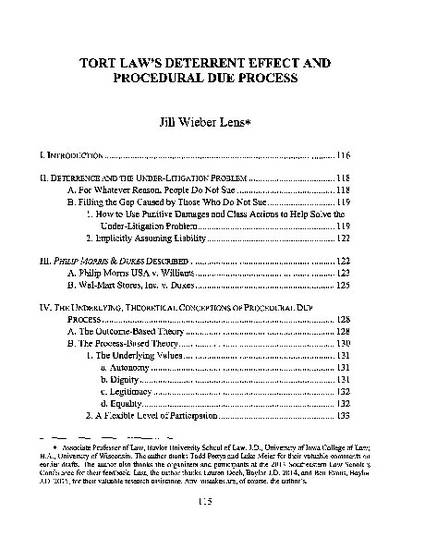
Article
Tort Law's Deterrent Effect and Procedural Due Process
Tulsa Law Review
(2014)
Abstract
The defendants in Philip Morris USA v. Williams and Wal-Mart Stores, Inc. v. Dukes claimed a right to present defenses. The defendants also both claimed that the mechanisms in place in those cases — the consideration of nonparties in imposing punitive damages and the use of sampling to litigate a large class action — violated that right. The Supreme Court agreed, a death knell for the advocated use of both mechanisms to counteract tort law’s under-litigation problem: the fact that not all injured persons sue, precluding tort law’s ability to achieve effective deterrence.
This Article argues that procedural due process theories do not support such a right. The process-based theory provides only a flexible level of participation and the defendants in both Philip Morris and Dukes had a meaningful opportunity to participate. The outcome-based theory also does not support such a right because the total damage obligations produced by the mechanisms are actually accurate. Even though no procedural due process right precludes the consideration of nonparties and sampling, the mechanisms are still problematic because of how they shift the burden of proof. The burden, however, is based in substantive law. And substantive law can be changed to help alleviate the harmful effects of tort law’s under-litigation problem.
Keywords
- due process,
- punitive damages,
- class actions,
- accuracy
Disciplines
Publication Date
2014
Citation Information
Jill W Lens. "Tort Law's Deterrent Effect and Procedural Due Process" Tulsa Law Review Vol. 50 (2014) p. 115 Available at: http://works.bepress.com/jill-lens/12/
